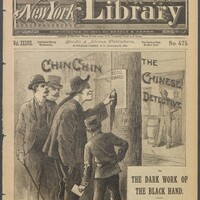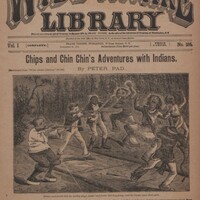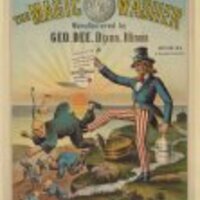Chinese Racialization / Erasure
Racializing and Erasing Chinese Immigrants
The Chinese Exclusion Act was the first national immigration law in the U.S. Enacted in 1862 as the Anti-Coolie Act, it became illegal to import some types of Chinese labor to the U.S.18 In 1875, the Page Act extended the previous provisions of the 1862 act and added a forced regulation of Chinese immigrants, which meant any Chinese migrant could be refused entrance at the border.19 In particular, the 1875 provisions affected those Chinese migrants who wished to bring their families to the U.S. Under this act, women, no matter their familial connections, could be deemed prostitutes and denied entry to the U.S.
Lisa Lowe notes that the Act of 1882 “emphasized that Chinese laborers recruited to work in mining, agriculture, and railroad construction … were precisely ‘unfree’ and therefore ineligible for citizenship.”20 In 1888, the Scott Act prohibited Chinese Americans from returning to the U.S. once they left the country for any length of time. These citizens often had their naturalization revoked making it all but impossible for them to return to their U.S. homes. According to Ben Railton, an 1894 Act “made it illegal for individuals affected by any of these laws to petition the government for redress.”21 It was not until the 1940s that some of the provisions of these acts would be rolled back, eliminated, and/or changed.
Dime novels painted Chinese immigrants as sneaky and greedy opportunists with no allegiance to the U.S. In Chin Chin the Chinese Detective; Or The Work of the Black Hand, the Chinese detective Chin Chin speaks “a tolerably good English, but with the peculiarity of changing all his r’s into l’s.”22 He is able to drink more alcohol than anyone he meets—he “likee ‘Melican whiskey,” and he always wins when he gambles.23 Chin Chin appears to be a cunning and crafty detective on the trail of kidnappers solely for the $1,000 reward money. Once Chin Chin rescues the heiress Miss Evangeline Carrickford, his accent disappears, he throws off his pigtail and simple robe, and reveals that he is Evangeline’s cousin Harry Carrickford. Harry has been in disguise the entire narrative. His father, wealthy confirmed bachelor Henry Carrickford, adopted him after Harry’s mother—“an angel on earth and now one above”—dies.24 Henry’s confession alongside descriptions of his adopted son Harry as ugly and “sallow-faced” suggest that the woman was Chinese and Harry is Henry’s actual son.25 Harry proves himself worthy of the Carrickford name through a racialization that erases any truth of his mother’s history.
18 Ben Railton, The Chinese Exclusion Act: What It Can Teach Us about America (New York: Palgrave Macmillan, 2013), 12.
19 Railton, The Chinese Exclusion Act, 12.
20 Lisa Lowe, The Intimacies of Four Continents (Durham, NC: Duke University Press, 2015), 27.
21 Railton, The Chinese Exclusion Act, 13.
22 Albert W. Aiken, Chin Chin, the Chinese Detective; Or, The Dark Work of the Black Hand, Beadle's New York Dime Library 37, no. 475 (New York, NY: Beadle and Adams, 1887), 2.
23 Aiken, Chin Chin, the Chinese Detective, 3.
No item selected

